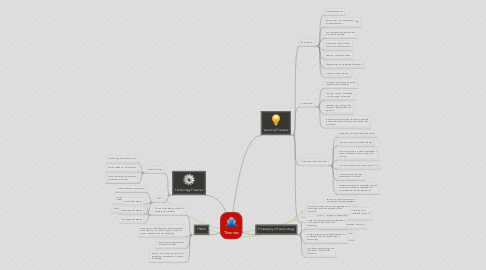
1. Technology Theories
1.1. Media Ecology
1.1.1. technology influences society
1.1.2. media creates our environment
1.1.3. media and technology shapes worldviews and ideas
1.2. SCOT
1.2.1. society influences technology
1.2.2. society influences if technology is deemed successful or not
1.2.3. advances are socially determined
2. TPACK
2.1. 3 kinds of knowledge should be employed by teachers
2.1.1. Content Knowledge
2.1.2. Technology Knowledge
2.1.3. Pedagogy Knowledge
2.2. these types of knowledge are interconnected so technology can be used to convey content in a manner aligned with one's pedagogy
2.3. these are important skill sets for teachers to build
2.4. teachers must recognize where their strengths and weakness lie in these knowledges
3. Learning Theories
3.1. Behaviourism
3.1.1. Stimulus-Response
3.1.2. Environment and consequences influence reactions
3.1.3. can use reward and punishment to motivate students
3.1.4. Practice can shape student behaviour and achievement
3.1.5. Learning is teacher directed
3.1.6. Teachers may model desired behaviours
3.1.7. may oversimplify learning
3.2. Connectivism
3.2.1. Learning occurs through creating connections and networks
3.2.2. Learning is active; knowledge must be sought by learners
3.2.3. Learning occurs through the sharing of diverse ideas and opinions
3.2.4. teacher must find activites which allow students to take ownership of learning and actively seek knowledge
3.3. Cognitivism/Cognitive Load
3.3.1. scaffolding will enable student learning
3.3.2. long term memory stores knowledge
3.3.3. short term memory is where knowledge is taken in between moving to long term memory
3.3.4. short term memory has a capacity of 7+/- 2
3.3.5. it is important to organize presentation of material
3.3.6. students must encode knowledge through mneumonic strategies, repetition and comprehensive analysis/application
3.4. Constructivism
3.4.1. learning is active; knowledge is constructed through experience
3.4.2. teachers must guide and facilitate learning experiences and engage in scaffolding (zone of proximal development)
3.4.3. students must take ownership of learning
3.4.4. collaborative, discovery and problem based learning
